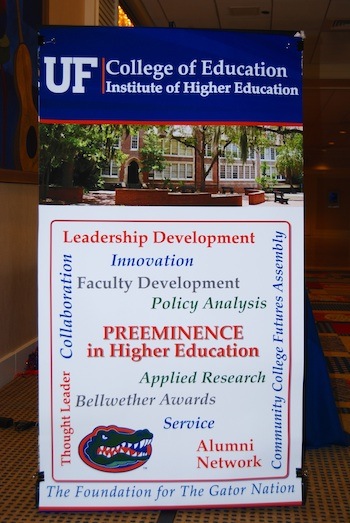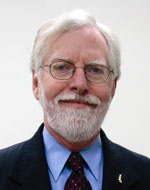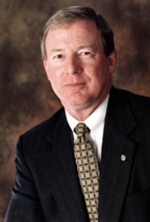With myriad underlying forces driving rapid change in higher education—more online courses and degrees, community colleges offering four-year baccalaureate degrees, declining funding, the looming shortage of qualified administrators, and student loan outrage, to name a few—the traditionally trend-setting Institute of Higher Education (IHE) at UF’s College of Education is rethinking how it can best meet the needs of higher education and its leaders.
 “Higher education is sailing into the perfect storm—a tsunami of changes in so many areas at once that institutions must prepare and plan for,” said IHE director Dale Campbell, a professor and head of UF’s higher education administration program. “For our institute to make effective, lasting change in today’s rapidly changing world, we first must look at ourselves and determine the best approaches and actions we can take in shaping the brightest future possible for higher education.”
“Higher education is sailing into the perfect storm—a tsunami of changes in so many areas at once that institutions must prepare and plan for,” said IHE director Dale Campbell, a professor and head of UF’s higher education administration program. “For our institute to make effective, lasting change in today’s rapidly changing world, we first must look at ourselves and determine the best approaches and actions we can take in shaping the brightest future possible for higher education.”
Campbell and other college and institute officials have launched a sweeping strategic planning process that, starting last June, has included focus groups and brainstorming sessions involving more than two dozen IHE alumni, graduate students and state and national leaders in higher education administration. The sessions were facilitated by Willis Holcombe, a University of Florida IHE alumnus, former chancellor of Florida’s community college system, president emeritus of Broward College and recently retired as interim president of Florida State College in Jacksonville.
The process culminated last week in Orlando, at a UF alumni gathering at the annual meeting of the national Community College Futures Assembly, where Campbell unveiled the resulting strategic plan outlining the IHE’s “re-energized” mission and vision.
Campbell said the IHE’s strategic planning process yielded four major goals:
GOAL 1: Strengthen higher education worldwide by developing the next generation of well-prepared, forward-thinking higher education leaders, by providing the educational experiences, learning and research environment and grounding in strategic change management to develop effective leaders and policymakers.
GOAL 2: Secure alliances with the Florida state college system, higher education leaders, alumni and state and national organizations to foster research-based policies and practices that enhance student learning and success—strengthening UF’s role as a national leader.;
GOAL 3: Position UF’s Institute of Higher Education as the premier thought leader in the state and nation on public policy in higher education;
GOAL 4: Serve as an independent research arm to the Florida college system, state government and national policy groups, addressing critical issues in higher education policy and practice.
“We will build upon our past success with a goal to become the premier graduate program in higher education administration in the nation,” Campbell said.
UF’s Higher Education Administration program has been a national force in graduate education since the mid-1950s, when the Florida Board of Control sought out UF education professor James Wattenbarger to steer the development of a state plan for community colleges. Wattenbarger guided the state community college system from 1957 to 1967 before returning to UF to become the founding director of the College of Education’s new Institute of Higher Education.
Since then, through the institute, UF higher education scholars have continued to provide mentoring, networking and professional development opportunities for higher education practitioners and leaders, with special emphasis on Florida community and state colleges, and on increasing college access for underrepresented groups.
The IHE has sponsored the annual Community College Futures Assembly in Orlando since 1995, with the group serving as a national independent policy think tank in tackling the most critical issues facing American community colleges. Last week’s meeting in Orlando marked the group’s 20th anniversary of its founding. The Futures Assembly also presents its nationally recognized Bellwether Awards at its annual meeting highlighting the “best trend-setting practices” among CCFA institutions.
The IHE’s new strategic plan lists several key objectives for both the short and long terms.
Short-term objectives, to be implemented over the next two years, include:
— Co-sponsor the International Conference on College Teaching and Learning set for this March;
— Develop a community college master’s degree in student affairs administration;
— Create applied research centers in Florida’s state colleges in the following areas—teaching and learning and advising; workforce development and economic development strategies; and public policy analysis, strategic management, resource development and financial management;
— Appoint IHE liaison to attend meetings of the Florida College System Council of Presidents and engage with appropriate representative on topics of mutual interest;
— And, additional strategies concerning IHE curriculum revision, internships for IHE graduate students, broader public relations initiatives, and strategies for developing revenue streams for institute sustainability.
Long-term strategies, for implementation over the next five years, include:
— Develop additional stackable credentials within the College of Education to create a new market for expansion and provide a career ladder into the IHE’s graduate programs.
— Secure external funding for endowed chairs in leadership development and in teaching and learning;
— Analyze current markets and trends and changing demographics to ensure program responsiveness and leadership;
“This strategic framework represents a first step in the strategic positioning of the Institute of Higher Education,” said College of Education Dean Glenn Good. “The institute leadership team and I will work with our faculty and staff to consider the plan’s potential impact on their school and modify the plan as needed.”
* * *
The College of Education and its Institute of Higher Education would like to thank the following faculty, alumni, colleagues and friends for their help in the development and drafting of the institute’s strategic plan:
IHE Strategic Planning Committee
— Glenn Good, dean, UF College of Education
— Willis Holcombe (committee chair), past interim president of Florida State College at Jacksonville
— Dale Campbell, professor and director of IHE and the FUTURES Bellwether College Consortium– Pedro Villarreal III, clinical assistant professor, HEA, UF College of Education
— Barbara Keener, chair of UF HEA Alumni Network, and core graduate faculty member in Leadership in Higher Education/Enrollment Management at the School of Education, Capella University
— Judith Bilsky, VP and provost, Florida State College at Jacksonville
— Kathryn Birmingham, CEO and principal, The Research Group
— Tina O’Daniels, associate director, IHE
— Maria Gutierrez Martin, senior director of development, UF College of Education
Focus group participants
— Polly Binns, executive director, Council for Resource Development
— Michael Brawer, CEO, Association of Florida Colleges
— Noah Brown, president and CEO, Association of Community College Trustees
— Walter Bumphus, president and CEO, American Association of Community Colleges
— Conferlete Carney, provost, St. Petersburg College
— Dennis Gallon, president, Palm Beach State College
— Carl Hite, president, Cleveland State Community College, Tenn.
— Kathy Johnson, president, Pasco-Hernando Community College
— Ed Massey, president of Indian River State College
— Kristy Presswood, associate vice president, Daytona State College
— Brian Polding, campus college chair of the School of Business, University of Phoenix (Fla.
— Angel Rodriquez, professor, Broward College
— Debra Volzer, executive director, Pearson Learning Solutions
— Kirk White, president, National Council for Continuing Education and Training
— Josh Wyner, executive director of the college excellence program, Aspen Institute
UF higher education administration students
— Uttam Gaulee, PhD fellow
— Xiadan Hu, PhD fellow
— Makaya McKnight, EdD student
— Timothy Wilson, PhD fellow
_____________________________________________________________________________________________________________________________
CONTACTS
SOURCE: Dale Campbell, director, UF Institute of Higher Education, and professor of higher education administration, UF College of Education; dfc@coe.ufl.edu, 352-273-4300
WRITER: Larry Lansford, director, news and communications, UF College of Education; llansford@coe.ufl.edu; 352-273-4137

